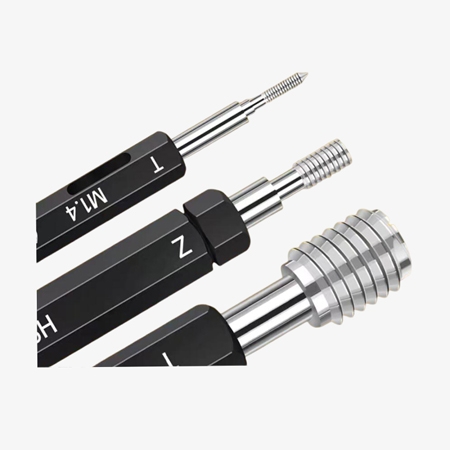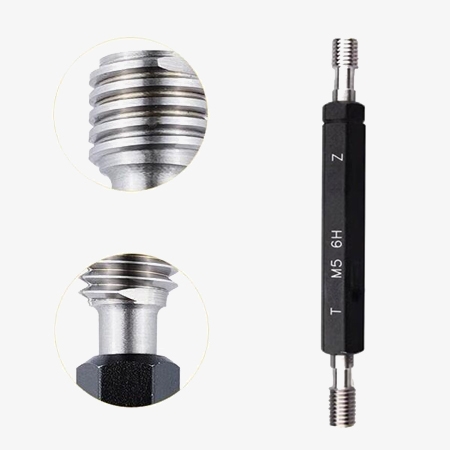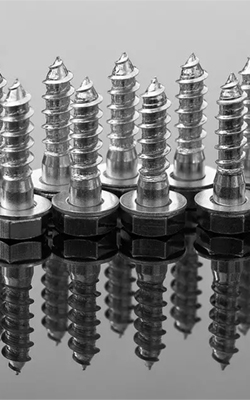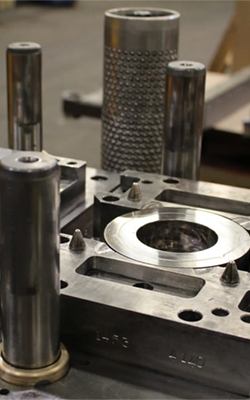Double ended go/no-go thread plug gauge with standard thread gauges 6H and 6g for metric measurements features high precision, wear resistance, durability, accurate precision, and stable structure, making it ideal for consistent and reliable measurements.

Design and Material Characteristics for Durability and Practicality
- Hexagonal Matte-Finished Handle Design: Easy to grip and hold, non-slip, convenient, and practical.
- GCr15 Bearing Steel: The measuring head is made of GCr15 bearing steel, subjected to rigorous heat treatment, achieving a hardness of 58-65HRC, with enhanced wear resistance and contact fatigue strength, making it less prone to deformation.

Functional and Performance Features for Accurate Thread Measurement
- Surface Heat Treatment Function: The double end thread plug gauge features high hardenability and stable performance.
- 60-Degree Spiral Thread Angle: It offers long-lasting wear resistance, with burr-free and highly precise threads.
- Precision Thread Measuring Surface: High-precision testing equipment ensures accurate measurement.
Applications
A screw thread plug gauge is used primarily to inspect and verify the accuracy and fit of internal threads in nuts, tapped holes, and other threaded components. It ensures that the threads conform to specific dimensional standards and tolerances, enabling reliable and secure fastening in mechanical assemblies. This gauge typically features "Go" and "No-Go" ends: the "Go" side should fit easily into the threaded part if it meets minimum specifications, while the "No-Go" side should not fit if the threads exceed maximum tolerance. Commonly employed in industries like manufacturing, automotive, aerospace, and quality control, thread plug gauges help maintain consistent production standards and prevent issues related to thread compatibility.

Thread Identification

Tool and Die Making

Automotive Industries

Machine Manufacturing
| Model | SISCO-TG-6H |
| Accuracy |
M0.8 - M0.2, M1.0 - M0.25, M1.2 - M0.25, M1.4 - M0.3, M1.6 - M0.35, M1.7 - M0.35, M1.8 - M0.35, M2 - M0.4, M2.5 - M0.45, M2.6 - M0.45, M3 - M0.5, M3.5 - M0.6, M4 - M0.7, M5 - M0.8, M6 - M1.0, M8 - M1.25, M10 - M1.5, M12 - M1.75, M14 - M2.0, M16 - M2.0, M18 - M2.5, M20 - M2.5, M22 - M2.5, M24 - M3.0, M21 - M1.0 |
| Material | Bearing Steel |
| Weight | 1kg |
Q1: What standards are used for thread gauges?
A1: Thread gauges are manufactured and calibrated according to various international and regional standards to ensure accurate and consistent measurements across applications. The most common standards include ISO (International Organization for Standardization) standards for metric threads, ANSI/ASME (American National Standards Institute/American Society of Mechanical Engineers) standards for unified threads in the U.S., BS (British Standard) for British Standard Whitworth (BSW) and British Standard Pipe (BSP) threads, and DIN (Deutsches Institut für Normung) for German threads. Additionally, there are standards like JIS (Japanese Industrial Standards) for Japanese thread specifications. These standards define parameters such as thread angle, pitch, and tolerances, ensuring compatibility and performance across diverse industries and applications.
Q2: How to know what size thread to use?
A2: To determine the correct thread size to use, you first need to identify key parameters of the threaded component: thread diameter, thread pitch (distance between threads), and thread type (metric, imperial, or another standard). Using a thread gauge is a simple way to measure these features, as it can help match the pitch and determine if the thread is coarse or fine. Additionally, consulting technical documentation, such as engineering drawings, standards tables, or specifications, can provide guidance on the appropriate thread size for a particular application. Consider factors like load-bearing capacity, material strength, and compatibility with mating parts to ensure the chosen thread size meets functional and safety requirements.
Q3: Can a thread plug gauge measure thread depth?
A3: A thread plug gauge is primarily designed to verify the accuracy of the internal thread size, pitch, and fit by assessing whether it meets specified tolerance limits. While its main function is not to measure thread depth directly, it can give a rough indication of depth if fully inserted, ensuring the thread extends to the required length without obstructions. However, for precise measurement of thread depth, a dedicated thread depth gauge or a combination of a plug gauge with other measurement tools is typically recommended.
Tips: How should thread gauges be maintained?
To maintain thread gauges in good working condition, it is crucial to keep them clean and free from debris, as dirt and contaminants can cause inaccurate readings or damage the gauge's precision surfaces.
Regularly wipe them down with a soft, lint-free cloth and apply a light coating of rust-preventive oil to protect against corrosion, especially if used in humid environments.
Store thread gauges in a dry place, ideally in protective cases, to prevent physical damage or deformation.
Handle them carefully to avoid dropping or knocking them against hard surfaces, as any dents or wear can affect accuracy.
Periodic calibration is also important to ensure the gauges meet specified tolerances, maintaining their reliability for precision measurements.
Thank you for buying industrial test and measurement equipment on SISCO.com, all products sold by SISCO and the partner cover a 12 months warranty, effective from the date of receiving the products.
What is covered?
SISCO is responsible for providing free spare parts, and free technical support to assist the customer to repair the defective products until the problem is solved.
What is not covered?
- Product purchased from anyone other than a SISCO store or a SISCO authorized reseller.
- Expendable parts.
- Routine cleaning or normal cosmetic and mechanical wear.
- Damage from misuse, abuse or neglect.
- Damage from use of parts other than SISCO approved.
- Damage from use outside the product’s usage or storage parameters.
- Damage from use of parts not sold by SISCO.
- Damage from modification or incorporation into other products.
- Damage from repair or replacement of warranted parts by a service provider other than a SISCO authorized service provider.
- Damage caused by the application environment not meeting the product usage requirements and the failure to perform preventive maintenance.

